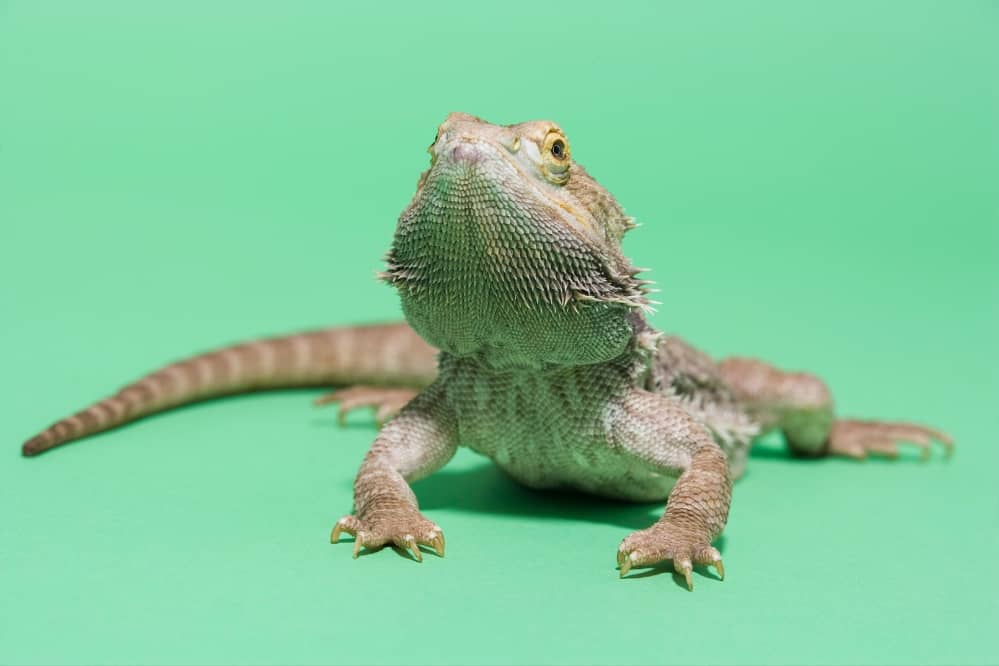Generally, the first thing that makes most first-time beardie owners concerned is that they can’t see their reptile’s pee. Naturally, humans and all other animals pee, and the same we expect from our bearded dragons. If you have landed on this page, it means, like many other first-time owners, you are also worried a bit because you have not seen your bearded dragon pee since its arrival and wondering, “Do bearded dragons pee?”
Yes, the bearded dragons pee, but like many other unique features, bearded dragons also have a unique way of getting rid of toxins. Actually, unlike humans or other animals (who pee in liquid form), bearded dragons excrete pee in concentrated form as dry, white powdery stuff. This white powdery substance is called urate or uric acid, and beardie usually passes concentrated urine along with the poo; however, you may also find urates separately occasionally. The best part of the story is that producing less or concentrated urine is natural for bearded dragons, so you don’t need to be concerned at all. Let’s learn more about this topic.
Why Bearded Dragons Produce Concentrated Urine?
Since bearded dragons come from the hot, arid lands of Australia, where water is not as easily available as in other areas of the world, their renal system has evolved to absorb maximum water and produce urine in concentrated form with minimum moisture level. Their ability to produce concentrated urine helps them to avoid dehydration and survive in water-scarce areas.
What If You Notice Little Liquid Around Urates Or Poo?
Sometimes you may notice a small amount of liquid around the poo or urates. Again this is also normal if the liquid is clear and doesn’t have any colored ting (e.g., reddish, blackish, greenish, etc.). This shows that your beardie is sufficiently hydrated, and it is ok to excrete a small amount of water. However, if the liquid is colored (red, black, green, etc.) it can be a matter of concern.
Urine Consistency Is Also Important In the Case Of Beradies
Now you know that bearded dragons produce concentrated urine in the form of white powdery urates; aside from the color, you should also pay close attention to the urine consistency. The pee or urates of normal and healthy bearded dragons is usually soft in texture. If the pee is hard, it could be a sign of dehydration. Though it may not be a case of severe or prolonged dehydration (or not necessarily indicate an emergency), it’s enough to alert you that your bearded fined need hydration.
So every time you notice that your beardie’s pee is a bit hard, give him a warm bath to help him gain hydration. You can give a warm bath daily or on alternate days depending on the urine consistency or level of dehydration.
How Often Do Bearded Dragons Pee?
We can’t predict exactly how many times a bearded dragon may pee daily because every individual beardie is different. In addition, the peeing frequency also depends on many factors like hydration status, age, diet, light intensity and duration, temperature, humidity, etc.
However, it has been observed that baby bearded dragons (less than three months of age) generally pee 1-3 times daily. Juvenile beardies from three to 12 months of age pee not more than once daily. After 12 months of age the peeing frequency decreases slowly, and adult beardies (18 months or older) usually pee once in two days (three times a week) to once a week.
What If Bearded Dragon’s Pee Is Yellow In Color
It’s normal if your bearded dragon produces yellow color pee occasionally. However, if he is excreting yellow color pee continuously, it can be a sign of dehydration. In this case, you should also consider factors other than the volume of water intake. Factors like too-high temperatures, too-low humidity, and excessive calcium intake can also give urine yellow color. So make sure to adjust these factors too.
Conclusion
Hopefully, you may be feeling a bit calmer at the moment; now you know that bearded dragons don’t urinate the way humans or other animals do, and their peeing frequency is much less than other animals.

